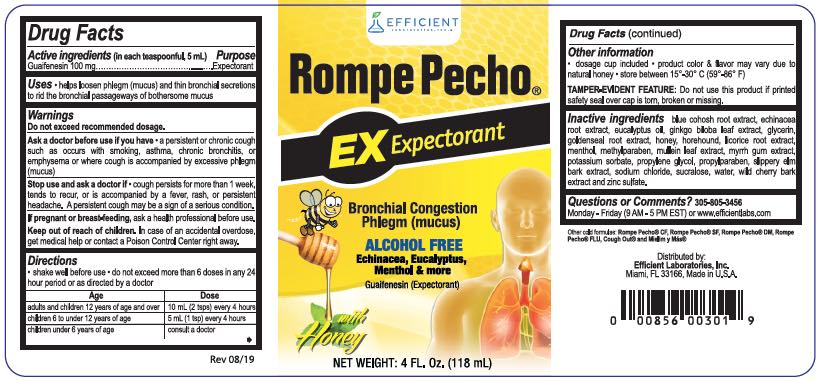
Despite a warning from the U.S. Food and Drug Administration that some of its Rompe Pecho cough syrup was contaminated and could make people sick, Efficient Laboratories waited more than two months to recall the tainted medicines.
The FDA warned of possible microbial contamination in the three versions of Rompe Pecho cold and flu medicines for children six years old and up. But didn’t specify what the specific bacterium or other microorganism might be.
“On October 9, 2019, FDA recommended that Efficient Laboratories recall Rompe Pecho EX and Rompe Pecho CF cough syrups. To date, the company has not taken action to remove these potentially dangerous medicines from the market,” the FDA said in an advisory on its website two days after it notified the Miami-based company of the problem.
It wasn’t until Jan. 31, 2020 that Efficient got around to issuing a recall for one lot each of three versions of its over-the-counter cough syrup.
“These three lots have been found to contain microbial contamination,” the company said in a recall announcement. “In rare circumstances, consumption of Rompe Pecho from these lots could result in vomiting and diarrhea.”
The recall affected one lot each of three brands of the cough syrup.
Recalled Rompe Pecho brands and lots
| Brand | Lot Number | Expiration Date |
|---|---|---|
| Rompe Pecho EX | 19F332 | June 2022 |
| Rompe Pecho CF | 19H359 | August 2022 |
| Rompe Pecho MAX | 19B42 | February 2022 |
Source: U.S. Food and Drug Administration
The lot numbers and expiration dates can be found on the bottom of cartons. Efficient notified distributors to return all unsold inventory from the lots.
Efficient said in its recall announcement that it had not received any reports of adverse events from the cough syrup at that time.
What to Do If You Have Recalled Rompe Pecho Cough Syrup
You should check to see if you still have any of the recalled brands and expiration dates in your medicine cabinet. The company advised people with recalled Rompe Pecho products to stop using them immediately and return them to the stores where they purchased the cough syrup.
If you have questions about the recall, you should call Efficient Laboratories at 305-805-3456. You should also call your doctor or other health care provider if you or a family member has gotten sick after taking the syrup.
The FDA encourages people to report any side effects or illness related to Rompe Pecho products to the agency’s MedWatch program. You can complete a report online or download a copy at the MedWatch website. Downloaded copies can be faxed to 1-800-FDA-0178 (1-800-332-0178).
Other Problems with Microbial Contamination
Microbial contamination is a relatively frequent reason for recalls of food, drugs, personal care products, biologics, medical devices and veterinary products.
Over-the-counter drugs, such as Rompe Pecho’s cough syrup, account for about 11 percent of microbial-related recalls, according to a 2012 study in the journal Microbiology.
Other microbial-related issues identified in 2019 included a toxin found in JUUL vaping pods and tattoo ink as well as contamination that led to the recall of over-the-counter stomach acid medicine.
Researchers found that some JUUL pods were contaminated with two types of microbial toxins — a fungal toxin called glucan and a bacterial endotoxin. Both showed up in tobacco and menthol-flavored pods, which are the only two flavors still available. Extended exposure to glucan can inflame the airways and lead to long-term lung damage.
In October 2019, a former JUUL Labs senior vice president filed a whistleblower lawsuit in California claiming that the company knowingly shipped one million contaminated pods. But his lawsuit did not specify what the contaminant was.
The lung damage from glucan is different from that in the outbreak of EVALI which led to severe lung injuries among e-cigarette users in 2019.
In May 2019, the FDA issued a safety alert over three brands of tattoo ink recalled due to microbial infection.
“Tattoo inks contaminated with microorganisms can cause infections and lead to serious health injuries when injected into the skin during a tattooing procedure, since there is an increased risk of infection any time the skin barrier is broken,” the FDA alert read.
The recall involved products manufactured by Scalp Aesthetics, Dynamic Color and Color Art, Inc.
In September 2019, Plastikon Healthcare recalled two lots of its milk of magnesia for microbial contamination. The products had been sold to hospitals and clinics for institutional use. A company announcement said those using the product were likely immunocompromised.
“Patients with compromised immune systems, such as patients in hospitals and nursing homes, have a higher probability of developing potentially life-threatening infections after taking a contaminated product,” the company recall announcement read.